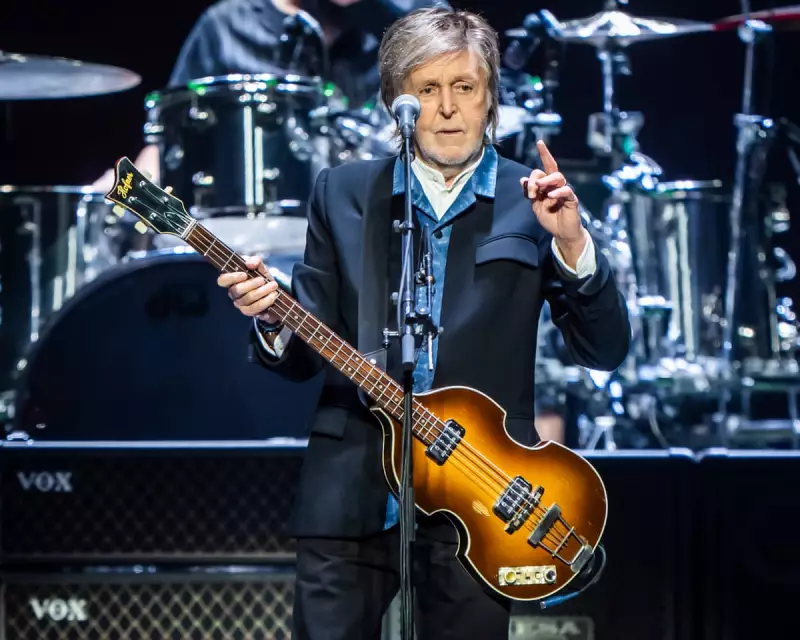
Sir Paul McCartney Joins Music Industry Protest with Near-Silent Track
In a powerful and unconventional move, Sir Paul McCartney has released his first new recording in five years—a track comprising almost complete silence. The piece, titled (bonus track), lasts for two minutes and forty-five seconds, a duration reminiscent of his classic With a Little Help From My Friends, but it starkly lacks any melody or lyrics.
Instead of the catchy tunes for which he is famed, the track offers only the quiet hiss of a recording studio tape, punctuated by the occasional, indistinct clatter. This artistic statement is part of a broader music industry protest against the use of copyrighted material by artificial intelligence companies without permission or payment of royalties.
The 'Is This What We Want?' Protest Album
McCartney's contribution features on the B-side of a protest LP named Is This What We Want?. The album, set for release on vinyl later this month, is filled with similar silent recordings from a host of prominent artists. These include Sam Fender, Kate Bush, Hans Zimmer, and the Pet Shop Boys.
The track listing itself spells out a direct message to policymakers: "the British government must not legalise music theft to benefit AI companies". This coordinated action aims to visually and audibly represent the potential silencing of original music if AI firms are allowed to exploit artists' intellectual property to train their generative models.
A Detailed Listen to the Silence
McCartney's silent piece is structured with a distinct narrative arc. It begins with a quick fade-up into 55 seconds of pure tape hiss. This is followed by a brief, 15-second interval of muffled clattering—perhaps a door opening and footsteps—before settling back into another 80 seconds of hiss, occasionally broken by rustling sounds. The track concludes with a slow, poignant fadeout, leaving the listener with the emptiness it seeks to protest.
The 83-year-old music legend, currently on tour in North America, has been a leading voice expressing concern over government plans to forge new agreements between creatives and major AI firms like OpenAI, Google, Anthropic, and Elon Musk's xAI.
Mounting Pressure on the UK Government
This protest comes as musicians intensify their campaign to persuade the UK government to reject proposals that would allow technology companies to train AI models on creative output without consent. Composer and campaigner Ed Newton-Rex, who is behind the album, stated his deep concern that "the government is paying more attention to US tech companies' interests rather than British creatives' interests."
The government is caught between two powerful sectors. On one side are the creative industries, which contribute a substantial £125 billion annually to the UK economy. On the other are US tech giants, who are pushing for light regulation and have recently pledged over £30 billion in investments, primarily in data centres.
Ministers have consulted on creating an exception to UK copyright law for "text and data mining," which could force copyright holders to actively opt out of their work being used to train AI. This approach has drawn sharp criticism from across the creative community.
Artist Kate Bush posed the haunting question, "In the music of the future, will our voices go unheard?" Composer Max Richter warned that the government's proposals "would impoverish creators, favouring those automating creativity over the people who compose our music."
International and Political Repercussions
The situation is further complicated by international pressure. Former US President Donald Trump has publicly argued that AI should be allowed to use copyrighted knowledge pools without complex negotiations, cautioning governments against making rules that hinder AI companies.
Within the UK, cross-bench peer and film director Beeban Kidron accused the government of being "unfit to govern in the economic interests of the creators," suggesting they are trying to appease both sides and satisfying neither.
While a new legal framework for AI and copyright is not expected to be debated in Parliament until 2026, the government has already signed deals with AI firms to boost adoption. In response to McCartney's protest, a government spokesperson stated they are committed to "driving AI innovation and ensuring robust protections for creators," and are engaging with both sectors.
McCartney himself has summarised the core fear driving this protest: "We've got to be careful about it... If AI wipes out [the chance for young composers to make a career], that would be a very sad thing indeed." His silent track serves as a stark auditory warning of that potential future.





